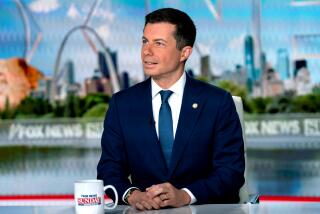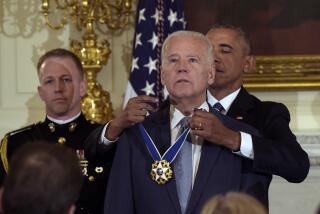He’s the man with the plan
- Share via
WASHINGTON — Early in the presidential race, Hillary Rodham Clinton asked former New Jersey Sen. Robert Torricelli whether the little-known political operative running Barack Obama’s longshot campaign was any good.
“I warned her,” said Torricelli, who was in a position to know.
The operative, David Plouffe, had helped Torricelli win his Senate seat in 1996. It was one of the most toxic campaigns in memory -- “unrestricted chemical warfare,” Rutgers political scientist Ross K. Baker called it -- and Plouffe demonstrated a talent for devising a campaign strategy, staying with it under fire and doing what it took to win.
Today, still largely unknown, the fiercely competitive 41-year-old Plouffe stands at the center of one of the best-funded, best-organized Democratic presidential campaigns ever. And just as it was against Clinton, unconventional audacity is the hallmark of his plan to beat John McCain -- audacity and Plouffe’s characteristic determination to keep close tabs on every phase of the campaign while maintaining one of the lowest profiles in national politics.
On the audacity front, conventional wisdom holds that Democratic presidential candidates must focus on battleground states such as Ohio and Florida because they can’t win a bundle of states across the South and the West that have gone Republican for decades.
Yet Plouffe plans to have Obama make a serious effort to carry some of those states even as he holds onto every state that Sen. John F. Kerry won in 2004 and goes all-out in the battleground states.
The same rejection of the orthodox marked Plouffe’s approach to the nomination battle. He was both architect and enforcer of a strategy that ignored others’ advice and gave primacy to the Iowa caucuses, then plowed resources into smaller states that chose delegates after the mass of contests on Super Tuesday.
As for Plouffe’s public profile, in a campaign inner circle marked by facelessness, no senior aide makes a greater point of avoiding public view than he does. David Axelrod, the mustachioed strategist who shapes Obama’s message, often acts as a campaign surrogate. Plouffe almost never does.
Yet he has a hand in virtually every aspect of Obama’s world: field organization, advertising and fundraising, including the delicate task of drawing erstwhile Clinton supporters into the fold.
Sarah Kovner, a longtime Clinton backer who was present when Plouffe met with a group of Clinton supporters in New York recently, said, “Some people still had questions and they asked questions, and he was persuasive.”
Though the Obama campaign is one of the best-funded in history, Plouffe is famously tight. Cab rides aren’t reimbursed -- just subway fare. Staff members are asked to double up in hotels. And Axelrod tells a joke that underscores Plouffe’s frugality: Wave your hand under the automatic towel dispensers in the restrooms at campaign headquarters and a towel comes out. Wave your hand a second time and a message pops up: “See Plouffe.”
When Plouffe emerges in public, it is sometimes to throw an elbow. It was he who called Clinton “one of the most secretive politicians in America today” and questioned whether she would be “open and honest with the American people as president.”
Sometimes the aggressiveness has backfired.
Earlier this year, Canadian television reported that an Obama economics advisor had told Canadian officials the Illinois senator’s assault on the North American Free Trade Agreement amounted to political maneuvering. Plouffe, in a conference call with reporters, issued six denials in the space of 65 seconds. “There’s just nothing to it,” he declared.
A few days later, the Associated Press got hold of a memo from a Canadian official that showed a meeting had taken place, that NAFTA was discussed, and that the Canadians came away with the impression that Obama’s criticism of free trade was political posturing.
“He went out and carried a message that he thought was true but wasn’t,” said Axelrod, who is partners with Plouffe in a Chicago-based political consulting firm.
As Plouffe looks toward November, he sees Obama as a candidate with the money, volunteers and organizational skill to rewrite the election map.
Laying out the strategy recently, Plouffe pointed to Virginia -- which hasn’t gone Democratic in a presidential election since the 1960s. “Win Virginia,” he said, “and it’s game, set, match.”
As for new voters, he said, “We know who these unregistered people are. . . . We’re going to go where they live and we’re going to convince them to register.”
Other Democrats think Plouffe can succeed.
“Look at the history,” said Rep. Rahm Emanuel (D-Ill.). “Insurgents are supposed to have one day in the sun and lose. The establishment comes back and whacks you.”
Not so with Obama’s campaign, Emanuel said. “These guys won.”
Plouffe, who has close-cropped brown hair and an aura of absolute confidence, got into politics while at the University of Delaware. Democratic strategist Joe Hansen hired him to work in a Senate race and they became close friends -- conserving money by subsisting on two-for-a-dollar hot dogs.
When Hansen went to work for Sen. Tom Harkin in Iowa, he asked Plouffe to come along. Plouffe at first declined, saying he wanted to work as a tennis pro. A few days later he called to say he would be there in 24 hours.
Plouffe’s knowledge of the Iowa caucus system helped shape Obama’s early focus on that state though many backers pleaded for a broader approach.
“The Iowa strategy was right for Barack because he didn’t have the name recognition and campaign infrastructure to run a national campaign,” said Valerie Jarrett, a longtime friend of the Obamas and a senior advisor to the campaign. “David, in a very steady, steely way, said: ‘This is our strategy and we’re sticking to it.’ ”
--
More to Read
Get the L.A. Times Politics newsletter
Deeply reported insights into legislation, politics and policy from Sacramento, Washington and beyond. In your inbox twice per week.
You may occasionally receive promotional content from the Los Angeles Times.










